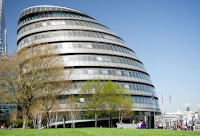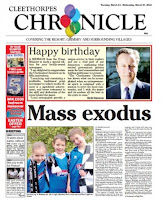 |
| Sunday Times' serialisation of Morton's book |
Andrew Morton in The Sunday Times [£] on the 25th anniversary of his book Diana: Her True Story: "The Archbishop of Canterbury, the chairman of the Press Complaints Commission, assorted Labour and Conservative MPs and a loose box of newspaper editors lined up to join the firing squad. Various bookshops banned the book — which had had to be printed in Finland as no British printer would touch it. It was a genuinely scary and frantic time. My daughters, then six and eight, burst into tears when they saw a newspaper cartoon of their dad being tortured on a rack inside the Tower of London with the Queen looking on. I faced the equivalent in my first British interview — a grilling from John Humphrys on Radio 4’s Today show."
Nick Cohen in The Observer on Liz MacKean, in January 2014: "The BBC has not treated its whistleblowers honourably or encouraged others to speak out in the future. Liz MacKean has had enough. Her managers did not fire her. They would not have dared and in any case the British establishment does not work like that. Instead, they cold-shouldered her. MacKean was miserable. The atmosphere at work was dreadful. The BBC wouldn't put her on air. She could have stayed, but she did not want to waste her time and talent and end up a bitter old hack. She chose the life of a free journalist instead and went off to work in independent – in all sense of that word – television."
Adam Boulton @adamboultonSKY on Twitter: "Sorry BBC Bruce Forsyth dying at 89 is not a lead news item...Over emphasize showbiz and you end up with President Trump."
Donald Trump at his Phoenix rally, as reported by the New York Times: “It’s time to expose the crooked media deceptions. They’re very dishonest people. The only people giving a platform to these hate groups is the media itself and the fake news...The media can attack me but where I draw the line is when they attack you. They are trying to take away our history and our heritage. They are really, really dishonest people and they are bad people and I really think they don’t like our country."
Jon Snow giving the MacTaggart lecture, reported by the Guardian: "For us in the media, the last two years have taught us that we all know nothing. The explosion of digital media has filled neither the void left by the decimation of the local newspaper industry, nor connected us any more effectively with the “left behind”, the disadvantaged, the excluded. Over this past year, we – me included – mostly London-based media pundits, pollsters and so-called experts, have got it wrong. The Brexit referendum: we got that wrong. Trump defied so-called experts, pundits and journalists alike. Theresa May’s strange general election – predicted to get a majority of 60-70: we got that wrong too. The Grenfell Tower disaster taught me a harrowing lesson – that in increasingly fractured Britain, we in the media are comfortably with the elite, with little awareness, contact, or connection with those not of the elite."
Ian Burrell on the Drum: "While Twitter is seemingly well-placed to benefit from resurgent public interest in news, the divisive nature of the biggest stories (Trump, Brexit, racism, Islamism) is feeding the angry exchanges which have damaged its appeal as a source of information and a showcase for advertising. Having the president of the United States choose your platform as his medium of choice would normally be a ringing brand endorsement but the morning outbursts of the 45th POTUS elicit a deeply polarised reaction and more confrontation."
Cleethorpes Chronicle founders Mark Webb and Nigel Lowther on the decision to close the independent weekly after nine years, as reported by HoldTheFrontPage: “We regret to announce that the Cleethorpes Chronicle has published its last edition. The decision is due to tough trading conditions. A shrinking advertising market does not allow us to continue producing the quality of newspaper our readers are accustomed to and deserve."
Janan Ganesh in the Financial Times: "The public elite talk a wonderful game about diversity and work in fields that have a better balance of women and men. But the private elite tend to work among more races and nationalities: some trading floors look like 1980s Benetton commercials. The same seems true of social background. I would advise a young graduate without relatives in high places to choose corporate life over the media."
Phil Creighton @phil_creighton on Twitter: "Every newsroom needs a pipe smoking, cardigan wearing curmudgeon who knows the patch intimately and correct basic errors like school names."
[£]=paywall
Donald Trump at his Phoenix rally, as reported by the New York Times: “It’s time to expose the crooked media deceptions. They’re very dishonest people. The only people giving a platform to these hate groups is the media itself and the fake news...The media can attack me but where I draw the line is when they attack you. They are trying to take away our history and our heritage. They are really, really dishonest people and they are bad people and I really think they don’t like our country."
Jon Snow giving the MacTaggart lecture, reported by the Guardian: "For us in the media, the last two years have taught us that we all know nothing. The explosion of digital media has filled neither the void left by the decimation of the local newspaper industry, nor connected us any more effectively with the “left behind”, the disadvantaged, the excluded. Over this past year, we – me included – mostly London-based media pundits, pollsters and so-called experts, have got it wrong. The Brexit referendum: we got that wrong. Trump defied so-called experts, pundits and journalists alike. Theresa May’s strange general election – predicted to get a majority of 60-70: we got that wrong too. The Grenfell Tower disaster taught me a harrowing lesson – that in increasingly fractured Britain, we in the media are comfortably with the elite, with little awareness, contact, or connection with those not of the elite."
Ian Burrell on the Drum: "While Twitter is seemingly well-placed to benefit from resurgent public interest in news, the divisive nature of the biggest stories (Trump, Brexit, racism, Islamism) is feeding the angry exchanges which have damaged its appeal as a source of information and a showcase for advertising. Having the president of the United States choose your platform as his medium of choice would normally be a ringing brand endorsement but the morning outbursts of the 45th POTUS elicit a deeply polarised reaction and more confrontation."
From the London's Assembly's economic committee report, The fate of local news – read all about it: "As local newspapers concentrate on their web presence, there is evidence of less ‘on-the-ground’ news reporting or investigative journalism…London needs a strong and credible local press. Without addressing the challenges the industry is facing, and finding solutions, we are at risk of losing one of our most important democratic functions. Action needs to be taken now to change the path for local newspapers. The decline of the industry and its impact on the workforce is leading to a less-credible news source. Hyperlocal news sources are a great addition to the industry, but questions remain about their ability to survive as they are often reliant on volunteers and can struggle to get reliable sources of funding.”
Cleethorpes Chronicle founders Mark Webb and Nigel Lowther on the decision to close the independent weekly after nine years, as reported by HoldTheFrontPage: “We regret to announce that the Cleethorpes Chronicle has published its last edition. The decision is due to tough trading conditions. A shrinking advertising market does not allow us to continue producing the quality of newspaper our readers are accustomed to and deserve."
Edward Lucas in The Times [£]: "Police, social workers, community leaders, Muslim groups and others need to work out proper rules for dealing with organised grooming when the suspects are from a similar ethnic or religious background. Crying “discrimination” and changing the subject won’t work. Politicians such as Mr Corbyn are paid to lead and frame such debates, not to close them down.
Moreover, for such discussions to have any chance of reaching truth and consensus, those taking part need to feel they can speak freely, and can advocate ideas and arguments that may in the end prove to be mistaken. They need to use papers like the mass-market Sun (where Ms Champion decried silence over the rape gangs) not the Labour leadership’s beloved Morning Star."Janan Ganesh in the Financial Times: "The public elite talk a wonderful game about diversity and work in fields that have a better balance of women and men. But the private elite tend to work among more races and nationalities: some trading floors look like 1980s Benetton commercials. The same seems true of social background. I would advise a young graduate without relatives in high places to choose corporate life over the media."
[£]=paywall














No comments:
Post a Comment